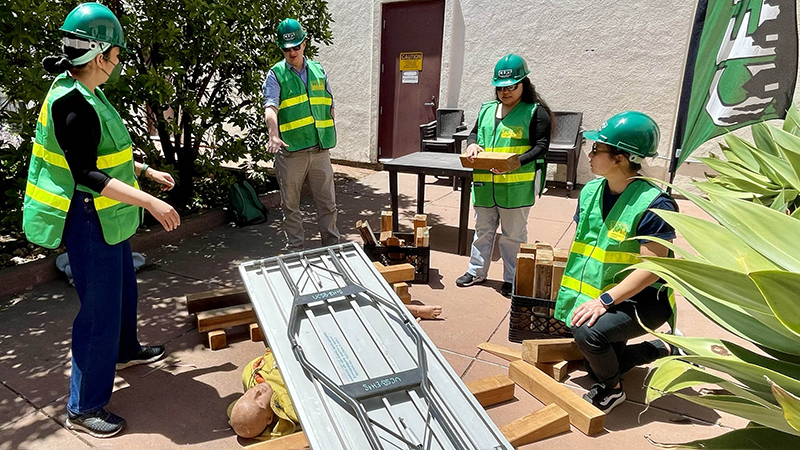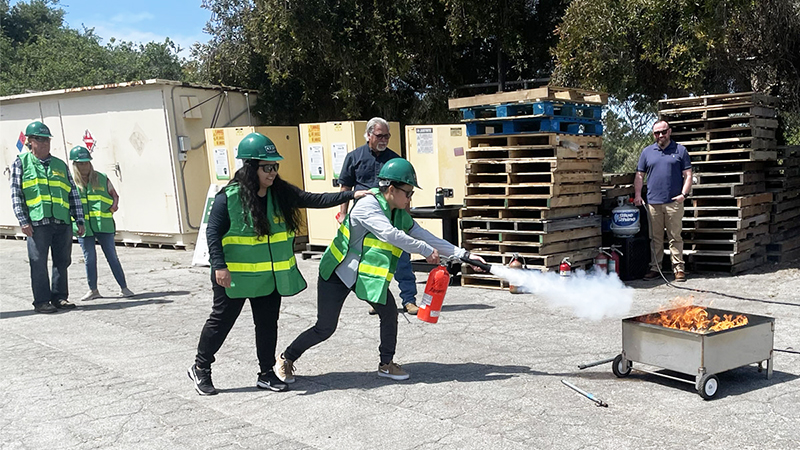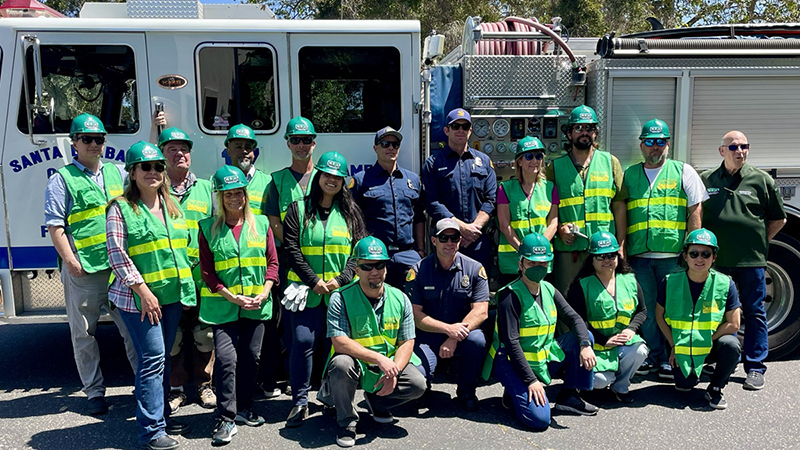UC Santa Barbara staff train to pitch in during a disaster
Share This Article

By Sarah Kidwell, UC Santa Barbara
The situation at UC Santa Barbara’s Emergency Operation Center (EOC), along Mesa Road, was tense. An earthquake had caused fires, building damage and an unknown number of injuries. Dressed in green hardhats and vests, several small groups of people assessed the situation, looked for victims and communicated with one another.
“We put out two fires and turned off the gas. My team heard some voices inside,” said one.
“I’m going to need some help getting people out,” said another.
Fortunately, it was only a drill.
For three consecutive Wednesdays this spring, 15 UC Santa Barbara staff members met at the EOC for a specialized disaster response program called Community Emergency Response Training (CERT). Now administered through the Federal Emergency Management Agency, CERT is a national program first developed by the Los Angeles Fire Department in 1985. Its goal is to train volunteer community members to assist at a disaster scene before professional first responders can arrive. The curriculum is universal, with the same skills taught in classes across the country.
Campus Emergency Manager Jim Caesar oversees the program on campus, which has been taught at UC Santa Barbara 61 times since 2010, and brings in members of Santa Barbara County Fire Department Station 17 and other community CERT trainers and experts to assist. Past groups have included staff, students and community members – the most recent group was mostly staff. Santa Barbara City Fire supports the final drill and assists UCSB in training the CERT instructors.
“What if 911 is not available?” Caesar asked during the first day of classroom-style training. “If we have a disaster that overwhelms the community and wipes out infrastructure – that’s where we’d need you folks,” he said, having issued special backpacks with tools, supplies, a hardhat and a vest. He and the other trainers were careful to note that CERT volunteers support emergency response efforts and enhance existing capabilities — they do not substitute for the services delivered by professional first responders. The CERT training offered on campus is voluntary, but everyone in the room had expressed an interest in learning new skills and helping out if needed.
“Having trained volunteers is good for the campus, but they can also take these skills home to help with their loved ones and in their neighborhoods. That’s just as important,” said Caesar. The backbone, he continued, is preparing yourself and being calm in an emergency.

Over three days the participants, who represented a range of different UC Santa Barbara departments, learned practical disaster preparedness and received hands-on training in fire safety and suppression, light search and rescue, disaster medical operations, and teamwork and organization. At a minimum, they were encouraged and taught how to prepare their homes and neighbors’ homes for a disaster, including stocking food, water and first aid. Beyond that, most finished the course with knowledge and skills they didn’t previously have – which will enable them to help out in many types of emergencies.
The CERT program popularized the practice of assigning incident commanders, who oversee teams with specific roles. For their final drill on their last day, those teams put their skills to the test in a mock exercise, and when the fire department showed up at the end, the incident commander made a situation report to the chief.
“It is only a drill,” said Santa Barbara County Fire Chief John Anderson, “but it does make everybody better. Organization is the hard part, and communication is key.”

Shawn Lemons, who manages meetings and events in the University Center and is also a department safety manager, said he took the course so he could be a resource to people if they need it.
“It’s something I hope I never have to use but I feel confident now that if something happened I’d be able to help people,” he said.
Joanna Hui, who works in UC Santa Barbara Library’s Special Research Collections, said she was grateful for the experience, the leadership training and especially the hands-on nature of the exercises.
“Definitely this training has helped a lot. I’m pretty tired, actually, from that last activity, and it was just a simulation — so I can’t imagine what it would be like to have a real one,” Hui said. “Realizing how much energy it takes, how do I have to take care of myself, conserve energy, move on, and lead.”
After three long days and the acquisition of plenty of useful skills, the final activity — posing for a group photo with the Santa Barbara County Fire Department — was a lot less taxing.
